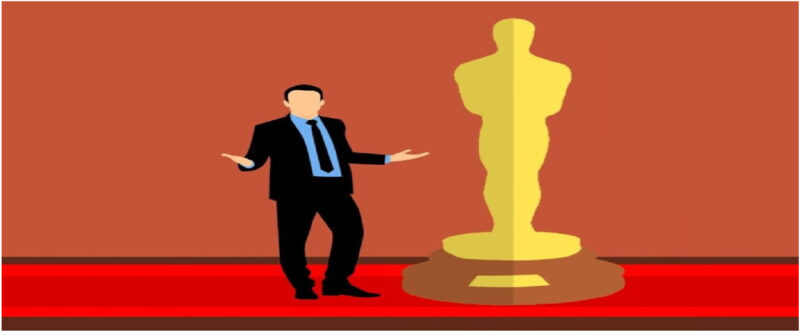How do Academy awards occur? Are the winners really a secret? What are the biases of the Academy towards nominees and winners? Do older or younger actors who have already won awards have a better chance to win an Oscar? Do famous movies have higher chances of winning? What are the greatest surprises in Oscar history and how might they be clarified? How can Oscars be predicted using statistics and probability? Have all predictions in the past been statistically correct?
To respond to the entirety of this inquiry we utilize statistical analysis. Statistics doesn’t mean hunting for absolutes and assigning a 0 percent or 100 percent value to everything. It means giving each piece of information the best possible weight and making an interpretation of those weights into probabilities.
Iain Pardoe is a Ph.D. and an independent consultant who also serves on the Faculty of Mathematics and Statistics at Thompson Rivers University, Canada has built a model which is considered to be one of the most accurate.
For the last 9 years, he has predicted the Oscars using probability and statistics. Factors are converted into data and using formulas, the output is converted into a chart. Math can’t guarantee any wins in Oscars, but they can predict the chances of winning.
Let’s look at the steps about how data is collected for nomination: –
According to 92nd Annual Academy Awards of Merit Rules, to be eligible for nominations in any of the feature film categories, a movie must meet these basic requirements:
- It must be a minimum of 40 minutes in length.
- It must have premiered in a movie theatre, during the appropriate calendar year.
- The film format must be in 35mm or 70mm or 24-frame, progressive scan digital format.
- It must have screened in an L.A. County theatre, for a week, beginning in the appropriate calendar year.
An Official Screen Credits form is submitted by the producer or distributor of the film to be considered for an Oscar nomination which lists the production credits for all related Oscar categories. These forms are then collected and the submitted films are listed in the “Reminder List of Eligible Releases.” In January, nomination ballots are mailed and a copy of the “Reminder List” is given to each Academy member. After which, the award-giving ceremony is hosted in February.
To make it simple for one to understand the Oscar predictions follow a principle wherein an exercise repeats itself over a period and creates enough patterns to guess the future outcomes.
As the 93rd Academy Awards are to be presented in February 2021, mathematicians can use the previous results as data with which a model is built. Then, using this data the future wins can be predicted. Iain’s model has predicted 71% of the Oscars wins.
After the data is collected, the datasets are run through an algorithm that is based on basic patterns shown in past data. The three basic patterns found are: –
- The Academy individuals choosing the Oscar winners are also present at the board to choose the Golden Globes, Directors Guild of America, Screen Actors Guild, BAFTA, and so forth. In this manner, their decisions can’t fiercely change between the various honors. For example, of the 78 Best Picture winners from 1943 -2020, 40 had recently won the Golden Globes. Therefore, the honors going before the Oscars are a critical data point.
- The interplay between the winners of the Best Picture and that of Best Director is also strong. For instance, between 1943 and 2020, only three movies have won the Best Picture without also receiving a Best Director nomination. Thus, the interrelationship between nominations adds to the last likelihood.
- Past nominations of the lead actors and directors increase their chance of winning. Though, past successes decrease the chance of a repeat in the case of Lead Actor and Lead Actress.
Weights are then assigned based on which of the above assumptions correlates strongly to the past Oscar winners. Using that relationship, the 2020 winners are predicted. The following table shows the predicted winners in the four major categories — Best Picture, Best Actor, Best Actress, Best Director — and their win probabilities.
But the actual winners for the Oscars 2020 were different from the predictions as ‘Parasite’ won for Best Picture instead of 1917 as it was predicted. Instead of Sam Mendes, Bong Joon Ho won the Best Director. But for the Best Actor and Actress, Joaquin Phoenix and Renée Zellweger won as predicted.
Out of the 4 main Categories, Iain’s predictions were right for 2 categories, that is Best Director and Best Actor. As predicted in the table, Alfonso Cuaron won Best Director and Rami Malek won Best Actor. Despite ‘The Favorite’ being ahead by 2 %, ‘Green Book’ won Best Picture and Olivia Colman won Best Actress rather than Glen Close who had about a 60% greater chance of winning.
The nominations and winners look very similar every year as Oscars prefer certain movies over others, whether it’s a social film or about historical events, it’s something we’ve all observed previously. Therefore, the predictions have been mostly correct. But, there have also been some notable exceptions: In 2009, the Indian movie “Slumdog Millionaire” was nominated for 10 Academy Awards and won in 8 categories including Best Picture and Best Director. ‘La La Land’ though having a 97 % chance of winning was superseded by 2016 winner ‘Moonlight’ who had only a 2 % probability of winning. ‘The Revenant’ having a 56% chance of winning was overtaken by the 2015 winner ‘Spotlight’ with a low 6% probability. The 2020 winner, ‘Parasite’, a Korean movie winning the race as a dark horse is also one of the exceptions.
The Oscars are not difficult to win as long as the rules of the game are understood and its key in statistics.
Trends are found in Oscars, which could make it easy to improve the model and predict next Oscar winners: –
- The longer the movie time, the probability of winning gets higher. This might not make sense, but as the analysis was done, it was found that 76% of the winners since 1960 have been more than two hours long. Longer films tend to make feel more important and Oscar loves the important movies which have a stronger or emotional message. Hence this is the reason why dramas are the king of awards, a huge 93% of the best picture winners are drama while only 2% is action and fantasy movies.
- As the calculations were majorly based on past predictions, about 71% of best picture winners have a director or a cast member who was previously nominated for an Oscar, and this trend carries on until today. Even though it does feel great to watch deserving great veteran actors or directors win an Oscar, but at the same time, seeing the same people repeatedly every year signifies that other creative independent talents are not being recognized.
Overall, we can say no model is 100% accurate. Every year, there need to be certain changes done in the model in order to make accurate predictions. Between 1938-2020, the model has explicitly predicted 71% of the Oscars winners, to be precise the model explicitly predicted 230 out of 324 awards with only enough data for the model to be able to predict from 1938 onwards. The odds become better with an 80% success rate considering only the last 15 years. As more data is added, it is more likely to obtain a better prediction. In-depth knowledge of math is not needed to understand Oscarmetrics, however, sometimes it can be confusing at times. Statistics and Oscar history can’t ensure any successes, yet they can direct the way towards the most anticipated wins
References
https://iainpardoe.com/oscars/
https://entertainment.howstuffworks.com/oscar3.htm
https://www.oscars.org/sites/oscars/files/92aa_doc_features.pdf
https://oscar.go.com/news/winners/oscar-winners-2020-see-the-full-list






